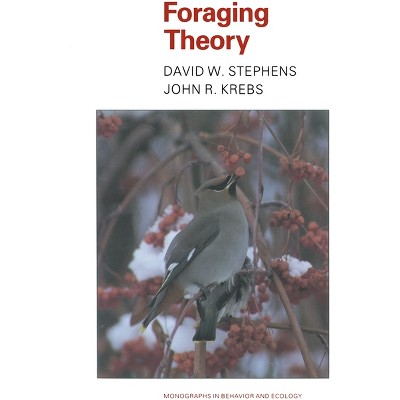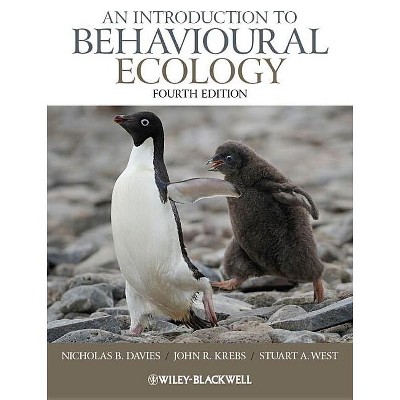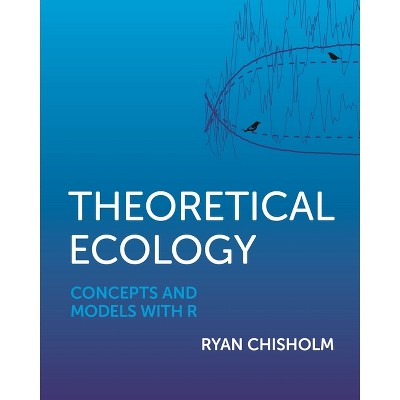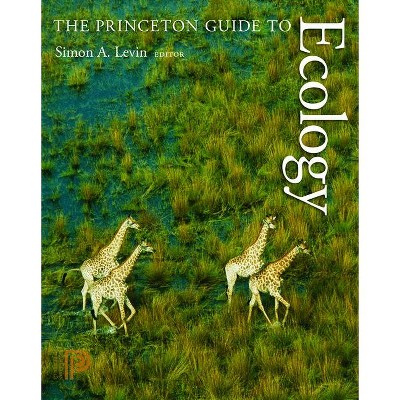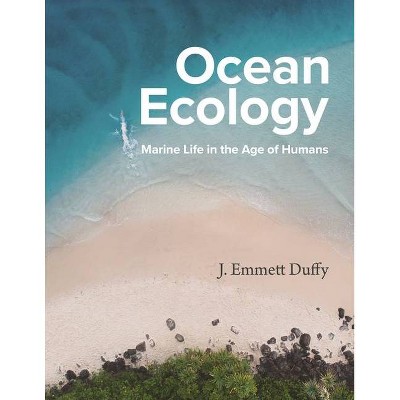Sponsored

Why Ecology Matters - by Charles J Krebs (Paperback)
$29.00
In Stock
Eligible for registries and wish lists
Sponsored
About this item
Highlights
- Global temperatures and seawater levels rise; the world's smallest porpoise species looms at the edge of extinction; and a tiny emerald beetle from Japan flourishes in North America--but why does it matter?
- About the Author: Charles J. Krebs is professor emeritus of zoology at the University of British Columbia and thinker in residence in the Institute for Applied Ecology at the University of Canberra.
- 208 Pages
- Science, Life Sciences
Description
About the Book
"Why Ecology? "is a short, accessible, supplemental ecology text suitable for nonmajors course adoption. Divided into twelve chapters, it covers everything from the geographic distribution of organisms and the limits on population increase, to species extinction and the sun s role in powering ecosystems. Each chapter presents a basic ecological topic by introducing a general problem or question, illustrating the problem with current examples, and linking the problem to pressing ecological issues in which humans play a central role, such as the spread of invasive species, climate change, overfishing, and biodiversity conservation. While other ecology texts tend to focus on ecological theory and practice, and relegate discussions of human impacts and their societal implications to separate chapters, "Why Ecology? "weaves these discussions throughout the book, unifying its various topics and highlighting our manifold connections to ongoing, global ecological concerns. "Why Ecology? "ultimately provides an appreciation of ecology rooted not in complex ecological theory or math, but in our contemporary world. "Book Synopsis
Global temperatures and seawater levels rise; the world's smallest porpoise species looms at the edge of extinction; and a tiny emerald beetle from Japan flourishes in North America--but why does it matter? Who cares? With this concise, accessible, and up-to-date book, Charles J. Krebs answers critics and enlightens students and environmental advocates alike, revealing not why phenomena like these deserve our attention, but why they demand it. Highlighting key principles in ecology--from species extinction to the sun's role in powering ecosystems--each chapter introduces a general question, illustrates that question with real-world examples, and links it to pressing ecological issues in which humans play a central role, such as the spread of invasive species, climate change, overfishing, and biodiversity conservation. While other introductions to ecology are rooted in complex theory, math, or practice and relegate discussions of human environmental impacts and their societal implications to sidebars and appendices, Why Ecology Matters interweaves these important discussions throughout. It is a book rooted in our contemporary world, delving into ecological issues that are perennial, timeless, but could not be more timely.Review Quotes
"Concise and easy-to-read. . . . The book would be a good option for use in an undergraduate ecology course to motivate and supplement the theory from a standard text, and it could be used as a main text if the teacher were prepared to use it as a hopping-off point for more in-depth theoretical instruction. I plan to use it in my introductory undergraduate environmental-science course because it covers a wide range of issues and gives more than enough context to motivate investigations of other disciplines. The book is also a good choice for nonstudents who want to learn more about environmental issues and the field of ecology. . . . Excellent."-- "BioScience"
"I . . . try to find topics and case studies that resonate with as many of my students as possible. This book provides a wealth of ideas and examples that do exactly that. And the presentation is perfect for a nonspecialist audience. . . . The result is a presentation that is lucid, concise . . . and effective."-- "Quarterly Review of Biology"
"Intended to engage a broad audience, this basic ecology textbook presents major ecological concepts as they operate in human-dominated ecosystems. Krebs, a master ecologist, very effectively uses a non-traditional approach to provide students from all disciplines with insights into how ecology can help us address human environmental impacts such as climate change, invasive species spread, overfishing, and extinction."-- "Ecology"
"Krebs employs engaging examples in support of the twelve ecological themes that he uses to structure the chapters. Each chapter begins with a list of key points and concludes with a summary, which reconnects the reader to the critical human factors associated with the chapter theme. . . . The writing style and interwoven contemporary anecdotes help connect the general reader to a deep appreciation for why ecology should matter to all. The book is replete with references and is fully indexed. Recommended."-- "Choice"
"The book is an essential text for any student of ecology or early career researcher wanting to brush up on an unfamiliar subject area--in fact, I wished that I had this text during my undergraduate years. It is also an essential text for politicians, business managers, medical professionals or farmers--anyone whose profession or business relies on understanding natural and biological systems. . . . Understanding ecological principles is vitally important for any human to understand their place in the world. We all need to think like ecologists to tackle the environmental and biological challenges we face every day and Why Ecology Matters is an excellent reference volume to have at hand."-- "Austral Ecology"
"The topics selected by Krebs make it clear why ecology matters; all topics are relevant because doing better is within our capabilities. We are reaching a point where it is no longer enough for ecologists to be the only ones who know ecology."-- "Conservation Biology"
"University of Chicago Press should be applauded for producing this book. It deserves wide marketing, well beyond the classroom. Every person in the world today needs a basic understanding of ecology, especially decision makers. . . . The book is also a great example of clear and effective writing and an example for all in science who need to communicate with non-experts. . . . The book makes an excellent undergraduate text and also an excellent general scientific book--a rare combination. It's also extraordinarily useful for the ecologist who wishes to improve their communications skills."-- "Biological Conservation"
"Why Ecology Matters is quite different from traditional ecology texts. Krebs does not attempt to cover classic studies or the authors of many of our main theories. To many ecologists, this will be a blasphemous approach to teaching ecology, but engaging a nonspecialist audience necessitates focusing on the major ideas and how they affect people, rather than on science per se. Rather than trying to cover all the core principles and concepts in ecology, Krebs covers twelve main messages, explicitly tying these messages to human-caused changes and impacts, as well as potential society feedback. In this way, he explores the full gamut of ecology for a range of readers."--Marc W. Cadotte, University of Toronto Scarborough, coeditor of "Invasive Species in a Globalized World: Ecological, Social, and Legal Perspectives on Policy"
About the Author
Charles J. Krebs is professor emeritus of zoology at the University of British Columbia and thinker in residence in the Institute for Applied Ecology at the University of Canberra. He is the author of Population Fluctuations in Rodents, also published by the University of Chicago Press.Dimensions (Overall): 8.9 Inches (H) x 6.0 Inches (W) x .5 Inches (D)
Weight: .6 Pounds
Suggested Age: 22 Years and Up
Number of Pages: 208
Genre: Science
Sub-Genre: Life Sciences
Publisher: University of Chicago Press
Theme: Ecology
Format: Paperback
Author: Charles J Krebs
Language: English
Street Date: May 25, 2016
TCIN: 1006093615
UPC: 9780226318158
Item Number (DPCI): 247-34-6621
Origin: Made in the USA or Imported
If the item details aren’t accurate or complete, we want to know about it.
Shipping details
Estimated ship dimensions: 0.5 inches length x 6 inches width x 8.9 inches height
Estimated ship weight: 0.6 pounds
We regret that this item cannot be shipped to PO Boxes.
This item cannot be shipped to the following locations: American Samoa (see also separate entry under AS), Guam (see also separate entry under GU), Northern Mariana Islands, Puerto Rico (see also separate entry under PR), United States Minor Outlying Islands, Virgin Islands, U.S., APO/FPO
Return details
This item can be returned to any Target store or Target.com.
This item must be returned within 90 days of the date it was purchased in store, shipped, delivered by a Shipt shopper, or made ready for pickup.
See the return policy for complete information.






